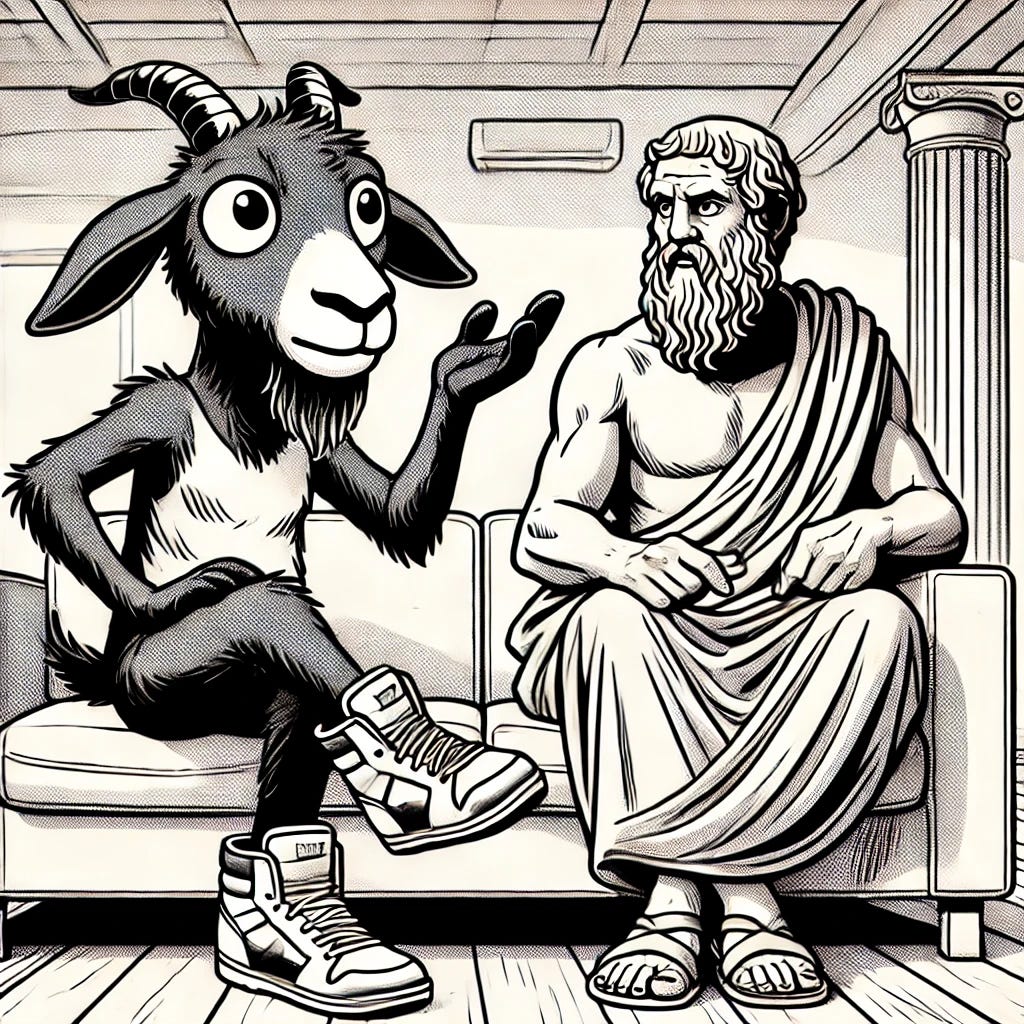Back in my day, we used to memorize stories!
Plato harrumphed as he slumped into the couch next to me.
Writing things down meant that anyone who possessed the ability to read could look things up. This was really cool if you wanted to know someone’s family lineage or to visit the history of the war between Athens and Sparta, but Plato wasn’t salty that anyone could access knowledge.
He was upset that writing meant that the ancient skill of memorizing long passages would go away. Plato feared that we might be trading in convenience for the ability to reason. Here’s a 2400 year old bit of wisdom to consider:
"For this invention will produce forgetfulness in the minds of those who learn to use it, because they will not practice their memory. Their trust in writing, produced by external characters which are no part of themselves, will discourage the use of their own memory within them. You have invented an elixir not of memory, but of reminding; and you offer your pupils the appearance of wisdom, not true wisdom."
Here’s the thing, though: most writing back then was for things like accounting or record-keeping, not storytelling or creative thinking. Plato calculated that the trade-off just wasn’t worth it, since writing didn’t seem to offer much to the wise person.
Fast forward to the Enlightenment, nearly two thousand years after the time of Plato. Printing presses were cropping up all over Europe, and literacy had become highly valued. Now, being able to read was considered a floor for acquiring knowledge—the bare minimum.
What we considered to be intelligent had evolved. Literacy wasn’t just a nice thing to have, but instead something you needed to function in the modern world. Gradually, as printing became more widespread, literacy began to creep up around the world. Between the start of the 19th century and today, global literacy has skyrocketed from 12% to 87%.
Imagine: one in eight people alive could read in 1800, and today it’s more like thirteen or fourteen. The ratio has nearly inverted.
Now, all the best thinkers in the world (apologies to Plato) were discussing their ideas with the language of print. Albert Einstein did not revolutionize physics by remembering long sequences of equations in his mind; instead, he built on the written works of other great thinkers. Writing was no hindrance for Einstein as he stood on the shoulders of giants.
During Einstein’s time, what was considered intelligent? Memorization still had some appeal, but it was becoming clear that cognitive offloading allowed you to use that same part of your brain for something else.
That something else is now constantly evolving. If you have all of the world’s nations’ capitals memorized, you’ll probably be congratulated by your friends or peers who wonder at your intellectual capacity. Congrats, long overdue!
I probably wouldn’t put this on my intelligence resume, though. Let me explain what I mean by way of an example.
If I ask you (right now, no cheating) what the capital of Benin is, could you tell me? You might be thinking no, but: what if you can look it up on your phone? I bet you could tell me within a few seconds.
Is it really that useful, then, to remember something like this? I think the answer is: yes and no. It really is useful to memorize things, because that’s a part of your mind that gets better when you tune it up like that, and you don’t just benefit by being able to memorize capitals. Instead, your entire mind gets just a little bit stronger.
On the flip side, remembering takes up mental space too. If you know about Porto-Novo, then you might not know about something else. Since you can quickly look up any world capital in a few seconds, and since you probably don’t need that info any faster than that, it makes sense to allocate that mental capacity somewhere else.
Just a few years ago, if you had asked the average person whether writing original poetry or having a conversation about nearly any subject was a sign of intelligence, I think the answer would be a resounding yes. Now, even some of the creative domain of intelligence seems to have been whittled away.
A lot of what was previously considered intelligence falls by the wayside, so what’s left behind? What do we get to keep?
The answer seems to be: higher and higher levels of comprehension, but only if we want to go and get them. While it is now possible to find answers to almost literally anything you want to know with a little bit of effort, it’s also easier than ever to check out, Idiocracy-style.
We have the ability to become wise and intelligent, but we have to decide to take that path.
Welcome to Costco. I love you.





We're on our way to progressing from Plato's "Writing things down is for losers who can't remember stuff" to the modern "Why should I write anything down if I can just use my voice to mumble a semi-coherent command to a chatbot who'll do the research and the draft for me?"
I kid, but only slightly.
I suppose Plato also told you that the whole memorization thing was something his mentor Socrates taught him....
I can't get the thought of oral memorization out of my mind without thinking about the people who memorized the collected works of certain authors in Ray Bradbury's "Fahrenheit 451" so that they would not be forgotten in that dystopian society. A fate we need to avoid.